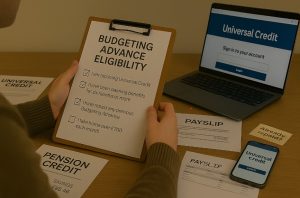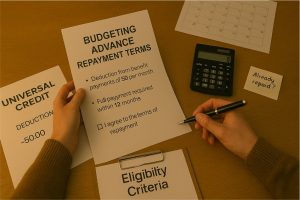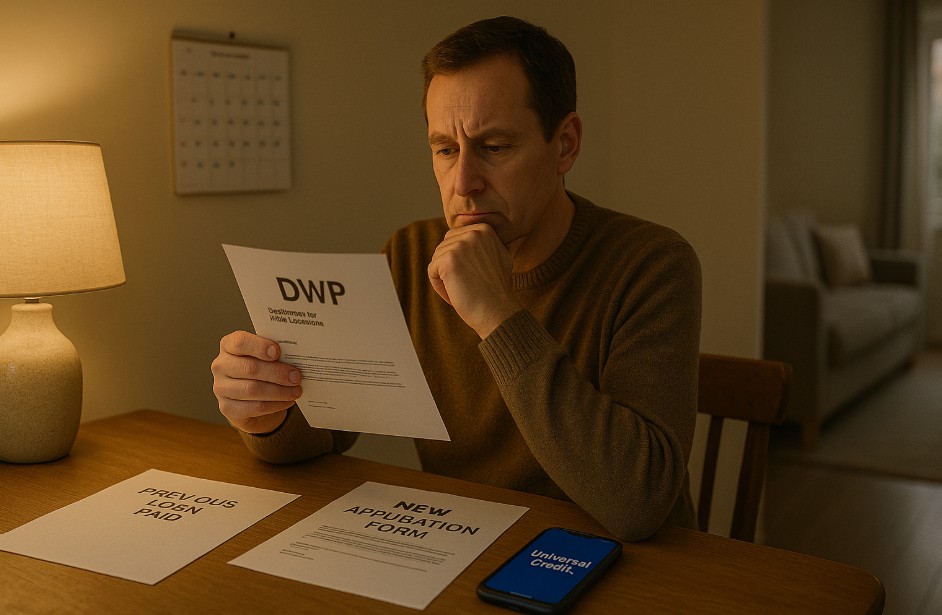Table of Contents
ToggleIf you’ve previously received a Budgeting Advance through Universal Credit and are wondering whether you can apply for another one, you’re not alone. Many claimants find themselves in need of further financial support after repaying their initial loan.
Understanding the eligibility rules, repayment terms, and application process is crucial when considering a second advance. This article outlines everything you need to know about reapplying for a Budgeting Advance, so you can make informed decisions about managing your finances.
What Is a Budgeting Advance and How Does It Work?

A Budgeting Advance is a form of interest-free loan available through Universal Credit to help claimants manage unexpected or necessary expenses.
These loans are typically used for costs such as replacing essential household items, travel for job interviews, or other urgent personal or family-related needs.
Unlike an advance payment, which is offered when waiting for a first Universal Credit payment, a Budgeting Advance is available only after an individual has already started receiving benefits.
The DWP (Department for Work and Pensions) assesses each application based on the claimant’s circumstances, including income and ability to repay.
The most common uses of a Budgeting Advance include:
- Work-related expenses, such as tools or uniforms
- Emergency home repairs
- Funeral or maternity-related costs
- Essential one-off items like a fridge or washing machine
When Can You Apply for a Second Budgeting Advance?
You can apply for a second Budgeting Advance only once the first one is fully repaid. The DWP does not allow more than one outstanding Budgeting Advance at a time. The policy is clear: claimants must settle any existing Budgeting Advance before reapplying.
After full repayment, a new application will be treated as a fresh request and will go through the same eligibility checks as the first.
What Are the Standard Eligibility Criteria for a Budgeting Advance?

To be eligible for a Budgeting Advance, several requirements must be met. The claimant must:
- Be receiving Universal Credit, Income Support, Income-based Jobseeker’s Allowance, Income-related Employment and Support Allowance, or Pension Credit
- Have been on a qualifying benefit for at least six months, unless the advance is related to employment support
- Have earned less than £2,600 in the past six months, or £3,600 if in a couple
- Have savings (capital) below £1,000
- Not repaying an existing Budgeting Advance
Eligibility is not influenced by credit scores but depends on benefit history, income, savings, and financial capacity to repay.
How Much Can You Borrow With a Budgeting Advance?
The loan amount depends on household circumstances. There is a minimum borrowing threshold of £100, while the maximum varies by household structure.
Maximum Budgeting Advance by Household Type
| Household Type | Maximum Loan | Notes |
| Single without children | £348 | The amount may be reduced if the capital is> £1,000 |
| A couple without children | £464 | The same capital rule applies |
| With children | £812 | Highest ceiling among eligible groups |
The amount received may be adjusted if the claimant has more than £1,000 in capital. For instance, someone with £1,250 in capital may only be eligible for a loan reduced by £250.
What Are the Repayment Terms for a Budgeting Advance?

Repayment of a Budgeting Advance is a key part of the Universal Credit loan process. Since the loan is interest-free, the Department for Work and Pensions (DWP) recovers the money through automatic deductions from your future Universal Credit payments.
Understanding how repayments work is essential before applying for a new or second advance.
How Long Do You Have to Repay the Loan?
The standard repayment term depends on when you received the advance. If your Budgeting Advance was issued before 4 December 2024, the repayment is typically spread over 12 months.
For any advances approved on or after 4 December 2024, the term has been extended to 24 months.
This change allows claimants more time to repay the amount borrowed, reducing the monthly deduction and making repayments more manageable for households with tight budgets.
How Are Repayments Made?
Loan repayments are automatically deducted from your Universal Credit award before you receive your monthly payment. The deduction continues until the total amount borrowed has been fully repaid.
You do not need to arrange or initiate the repayment manually; the DWP manages the process. The monthly deduction amount is calculated based on what is considered affordable for your circumstances, but it must be repaid within the designated timeframe.
In cases where your Universal Credit award is too low to cover the full deduction, the DWP may reduce the amount temporarily or extend the repayment period slightly, though this is assessed on a case-by-case basis.
Can You Repay a Budgeting Advance Early?
Yes, early repayment is allowed. If you find yourself in a better financial position or wish to clear the balance ahead of schedule, you can contact the DWP and request to make a larger payment or repay the full balance.
However, early repayment does not automatically entitle you to a new Budgeting Advance. You must still meet all the standard eligibility requirements, including benefit duration, income thresholds, and capital limits.
Repaying early may improve your affordability assessment but is not a guarantee of approval for a new advance.
What Happens If Your Circumstances Change?
If your income changes, you start working, or your Universal Credit award decreases, your ability to repay the advance may be affected. In such situations, the DWP may review your repayment schedule.
They may:
- Adjust the monthly repayment amount
- Extend the repayment period slightly (within allowable limits)
- Delay deductions temporarily if you experience severe financial hardship
It’s essential to inform Universal Credit of any changes as soon as possible. Failing to report a change could result in incorrect deductions or delays in resolving repayment issues.
What If You Stop Claiming Universal Credit?
If your Universal Credit claim ends while you still owe money on your Budgeting Advance, the DWP will contact you to arrange direct repayment. This may involve setting up a direct debit or agreeing to pay by other means.
If you don’t arrange repayment, the DWP may take further action to recover the debt. This could include involvement from debt collection agencies or deductions from other benefits you receive.
Can You Top Up an Existing Budgeting Advance?
Topping up an existing Budgeting Advance is not permitted. Claimants are not allowed to increase the value of an existing advance, even if they did not borrow up to their maximum allowance initially.
Each Budgeting Advance is treated as a standalone financial transaction. A new application can only be considered once the existing advance is fully repaid.
If the original loan amount was below the maximum threshold for the individual or household, the unused balance does not carry forward or count towards a future top-up.
How Do You Apply for a Budgeting Advance Again?

Reapplying for a Budgeting Advance requires contacting Universal Credit support services. The process is handled either through a call to the Universal Credit helpline or a conversation with a Jobcentre Plus adviser.
Applicants are assessed based on:
- Current financial obligations
- Monthly income and capital
- Ability to repay the new loan within the set timeframe
The DWP will also consider any recent changes in the applicant’s employment status, benefit entitlements, or household situation. Decisions are usually made promptly, often on the same day of the request.
What Are Common Reasons for Being Denied a Second Advance?
Reapplying for a Budgeting Advance after full repayment may seem simple, but several important factors can result in your application being declined. The DWP reviews each case individually and assesses both your financial circumstances and benefit history before making a decision.
Outstanding Financial Commitments
Even if you’ve repaid your initial advance, other ongoing deductions from your Universal Credit can influence the DWP’s decision.
These may include repayments for previous benefit overpayments, sanctions, or rent arrears. If your monthly income is already heavily reduced due to these deductions, a new advance may not be considered affordable, and therefore, your application may be refused.
Capital That Exceeds the Limit
A common reason for denial is having savings or capital above the allowed threshold. If you or your partner has more than £1,000 in accessible savings, the DWP either reduces the loan amount or declines the application entirely.
For instance, a claimant with £1,200 in savings might see their maximum loan reduced by £200. This ensures that the loan goes to those most in financial need.
Insufficient Time on Benefits
Claimants are required to have been receiving qualifying benefits for at least six consecutive months unless the advance is directly related to obtaining or staying in employment.
If you’ve recently started your claim or had a break in your benefit period, this requirement may not be met. The DWP uses your claim history to confirm this eligibility condition.
Income Above the Threshold
Your earnings over the six months leading up to your application are also reviewed. Exceeding the income threshold of £2,600 for single applicants or £3,600 for couples can make you ineligible.
This figure is based on total net earnings and applies regardless of whether the income was from permanent or temporary work. Many claimants are unaware that even short-term increases in income can affect eligibility.
Concerns About Repayment Capacity
The DWP assesses your financial situation to determine whether a new advance is realistically affordable. If you struggled to repay a previous advance, requested reduced payments, or demonstrated financial hardship during that time, your ability to manage a second advance may be questioned.
In such cases, the DWP may decide it would be unwise to issue another loan, even if technically eligible.
Inappropriate Use of Funds
Budgeting Advances are intended for specific, essential purposes such as household emergencies, job-related expenses, or one-off purchases.
If the reason provided for the advance does not fall within the permitted categories, the application can be denied. Items considered non-essential, such as luxury goods or discretionary spending, are not eligible reasons for support.
Recent Personal or Household Changes
Changes to your household or financial situation may also impact your eligibility. If you’ve moved in with a partner, taken on a new job, or experienced a shift in dependents, the DWP may reassess your claim entirely before approving any further support.
In such cases, your advance request could be delayed or rejected until a new financial assessment is complete.
What Are Some Alternatives If You’re Not Eligible for a New Advance?

In cases where a claimant cannot obtain a second Budgeting Advance, other forms of financial assistance may be available through government or community-based support channels.
Alternative Support Options
| Support Type | Description |
| Advance Payment | For individuals awaiting their first Universal Credit payment |
| Local Welfare Assistance Schemes | Council-funded support for emergency situations |
| Financial Hardship Payments | For those facing benefit sanctions or sudden financial crises |
| Support from Charities | Vouchers, grants, and interest-free loans for those in urgent need |
| Credit Unions | Low-interest community loans for people on a low income |
These alternatives often have different eligibility rules and application processes. Claimants are encouraged to consult with their local authority or a Citizens Advice adviser for tailored guidance.
Conclusion
A second Budgeting Advance is possible, but only once your previous one has been fully repaid and you meet all eligibility criteria.
Whether you’re facing a new financial challenge or simply need help covering unexpected costs, understanding how the system works can improve your chances of getting approved again.
If you’re not eligible, consider other support options like hardship payments or local welfare schemes. Always review your financial situation carefully and seek advice if you’re unsure about your options.
Frequently Asked Questions
How soon can I apply for a new budgeting advance after repaying the last one?
Once the previous advance is fully repaid, you can immediately apply for another one, subject to standard eligibility checks.
Can I repay my budgeting advance early to get another one faster?
Yes, you can repay early, but you’ll still need to meet all eligibility criteria to be considered for a new advance.
Will my credit score affect my eligibility for a budgeting advance?
No, Budgeting Advances are not based on credit scores but on your benefit status, income, and ability to repay.
Can I apply for a budgeting advance online?
No, applications must be made via phone or through your Jobcentre Plus adviser.
What should I do if my budgeting advance application is denied?
You can ask for a reconsideration or explore alternative financial support like local welfare schemes or hardship grants.
Are there other types of financial help available besides budgeting advances?
Yes, options include advance payments, hardship payments, and help from charities or local councils.
Can I use a budgeting advance for rent or moving costs?
Yes, rent deposits and moving expenses are valid reasons for applying for a Budgeting Advance.




